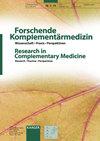Abstracts from the International Congress on Complementary Medicine Research, May 11-13, 2007, Munich, Germany.
Q Medicine
引用次数: 4
Abstract
The quantity and quality of research in complementary therapies has increased dramatically over the last decade in parallel with the expertise and intellectual capacity available for evaluating this challenging field. While CAM research is highly heterogeneous, many of the questions and problems within CAM are similar and researchers in general benefit enormously from exchanging ideas. In 2000, the Centre for Complementary Medicine Research at the Technical University in Munich hosted a congress titled ‘Evidence-Based Complementary Medicine – State of the Evidence and Methodological Challenges’. This event was organized in collaboration with the Centre for Alternative Medicine Research and Education, Beth Israel Deaconess Medical Centre, Harvard Medical School. A total of 80 abstracts from 14 different countries were submitted for presentation, of which 65 were accepted [1]. Now in 2007, the Centre for Complementary Medicine Research and the International Society for Complementary Medicine Research (ISCMR) have jointly-organized the International Congress on Complementary Medicine Research which will be held Munich in May. ISCMR was established in 2003 to foster co-operative and multidisciplinary research and development within complementary, traditional and integrative medicine. We hope that ISCMR will build on its success and continue to be a major international forum for researchers in the field. These continuing conferences will be the forum through which leading Complementary and Alternative Medicine (CAM) researchers can present their new research and discuss future strategies. The conference organisers received a total of 264 abstracts from researchers in 26 different countries. In order to ensure scientific quality and to manage the Congress schedule, the Scientific Committee appointed a reviewing panel of 55 international expert volunteers. We are very grateful to them for their time, effort and expertise and would like to formally thank them for their work. Each abstract was evaluated by two external peer reviewers focussing on the criteria ‘relevance’, ‘clarity of methods’, ‘quality of writing style’ and ‘global assessment’. All the abstracts were also read by two of the conference organizers; only if the external peer reviewers disagreed were the actual scores used to decide upon the submission’s acceptance. Typical reasons for low scores were: prior publication of the submitted work, lack of clarity in the abstract, poor English, or a subject which might not be of interest to most Congress participants. We unfortunately had to reject 33% of the abstracts submitted, resulting in a scientific program of real excellence with 68 oral and 110 poster presentations. The variety of research topics submitted has increased dramatically when compared to the 2000 conference (see table). While in 2000 ‘miscellaneous topics’ comprised mainly methodological issues, these conferences’ abstracts now contain a number of new discrete disciplines such as Anthroposophical Medicine and MindBody Medicine, as well as highlighting a number of is-国际补充医学研究大会,2007年5月11-13日,德国慕尼黑。
本文章由计算机程序翻译,如有差异,请以英文原文为准。
求助全文
约1分钟内获得全文
求助全文

 求助内容:
求助内容: 应助结果提醒方式:
应助结果提醒方式:


